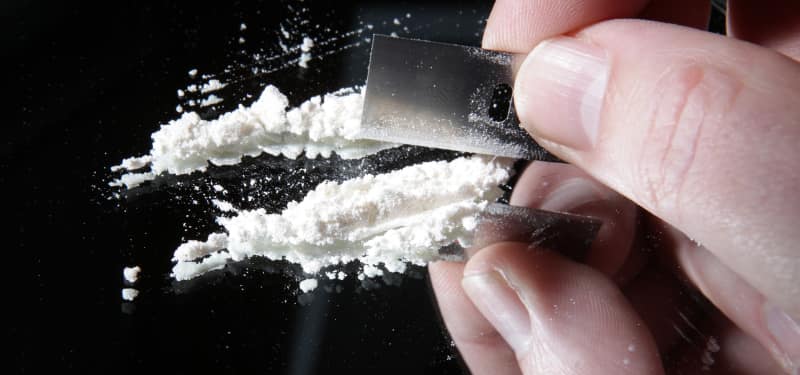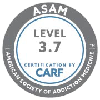Long-term effects
The long-term effects of cocaine depend on the method someone uses to get high[6]:
- Snorting cocaine: nosebleeds, loss of smell, trouble swallowing, and recurring runny nose.
- Smoking cocaine: Coughing, trouble breathing, asthma, and increased risk for developing respiratory infections.
- Eating cocaine: Reduced blood flow causes extreme bowel decay.
- Injecting cocaine: Increased risk of contracting bloodborne diseases like HIV, hepatitis C, scarring, collapsed veins, and skin infections. [6]
How do people become addicted?
Repeated cocaine use creates long-term changes in the brain’s reward area and other brain systems, which can lead to addiction. [6] This brain reward area adapts to the increased dopamine levels that cocaine causes, becomes less sensitive, and causes withdrawal. Withdrawal symptoms drive people to take strong and more frequent doses attempting to feel the same high they had experienced before. [6]
Who is at risk of cocaine addiction?
Cocaine use can lead to addiction in anyone who uses it. People with a family history of cocaine use (or other drug or alcohol use) and dependence or who have a mental illness such as depression or anxiety are at increased risk for addiction.
What are the symptoms of withdrawal?
Individuals generally experience withdrawal symptoms a few hours after the last dose. Acute withdrawal symptoms vary from person to person but commonly last 1-2 weeks. Long-term symptoms, also called chronic withdrawal, can last up to two months after the last dose.
Cocaine withdrawals can include a range of symptoms, such as:
- Slowed thinking or difficulty concentrating.
- Increased appetite
- Agitation and restless behavior
- Depression and anxiety
- Fatigue
- Trouble sleeping, vivid and unpleasant dreams [2]
People may crave cocaine and experience depression for months after stopping cocaine, and some people may have suicidal thoughts. [2]
What treatment options are available?
Treatment options depend on how severe the symptoms are. Some people benefit from live-in treatment programs that help monitor individuals and provide resources to help them overcome addiction.
Cognitive-behavioral therapy: Cognitive-behavioral therapy (CBT) is an effective treatment for preventing relapse. CBT teaches patients critical skills which support long-term abstinence, like recognizing situations they are most likely to use cocaine and avoiding those situations, and may be used in combination with other types of therapy.[7]
Contingency management: Contingency management (CM) is one form of behavioral-based therapy that shows promising results in people who have cocaine use disorders. CM uses motivational incentives, like rewards for patients who abstain from cocaine or other drugs. [7] Patients who show drug-free urine tests earn points or chips that can be exchanged for things that promote healthy living, like gym memberships, movie tickets, or dinner at a local restaurant. [7]
Therapeutic communities: Therapeutic communities (TCs), also called drug-free residences, a treatment options where people stay in vocational rehabilitation or other facilities and people in recovery for substance use disorders help each other understand and change behaviors. [7] TCs sometimes require a 6-12 month stay. They often include supporting services that help individuals successfully return to society and may offer additional support that help can help improve legal, mental health, and employment outcomes. [7]
Community-based recovery groups: Community-based recovery groups like Cocaine Anonymous use a 12-step program to help people maintain abstinence. Individuals attending Cocaine Anonymous help provide support to each other through sharing their experiences, problems, and issues. [7]
Long-term Outlook: Cocaine Detox in Orange County
People experiencing cocaine withdrawal frequently turn to alcohol, sedatives, hypnotics, or anti-anxiety medications to treat symptoms because cocaine use can be difficult, and relapse is possible. [2] It is not recommended to continue these drugs long-term because it leads people to recover from switching from dependency on one drug to another.
Withdrawal from chronic substance use is severe, and there is the risk of overdose, depression, and suicide.
Getting Help with Cocaine Detoxification
Cocaine detox in Orange County is a critical first step in cocaine addiction recovery, and it’s important to find an detox program that can offer the necessary resources and care.
If you want to know more about the Saddleback Recovery cocaine detox in Orange County, call our addiction specialists today: 877-843-5724. We are ready to answer your questions and guide you for your next step.
Sources
- Cabé, J., Brousse, G., Pereira, B., Cabé, N., Karsinti, E., Zerdazi, E. H., Icick, R., Llorca, P. M., Bloch, V., Vorspan, F., & De Chazeron, I. (2021). Influence of Clinical Markers of Dopaminergic Behaviors on Depressive Symptoms During Withdrawal in Cocaine Users. Frontiers in psychiatry, 12, 775670. https://doi.org/10.3389/fpsyt.2021.775670
- MedlinePlus [Internet]. Bethesda (MD): National Library of Medicine (US); Cocaine Withdrawal; [updated 2021 Feb 12; https://medlineplus.gov/ency/article/000947.htm
- Morton W. A. (1999). Cocaine and Psychiatric Symptoms. Primary care companion to the Journal of clinical psychiatry, 1(4), 109–113. https://doi.org/10.4088/pcc.v01n0403
- National Institutes of Health (n.d.). What is the scope of cocaine use in the United States? National Institute on Drug Abuse. https://nida.nih.gov/publications/research-reports/cocaine/what-scope-cocaine-use-in-united-states
- Nestler E. J. (2005). The neurobiology of cocaine addiction. Science & practice perspectives, 3(1), 4–10. https://doi.org/10.1151/spp05314








